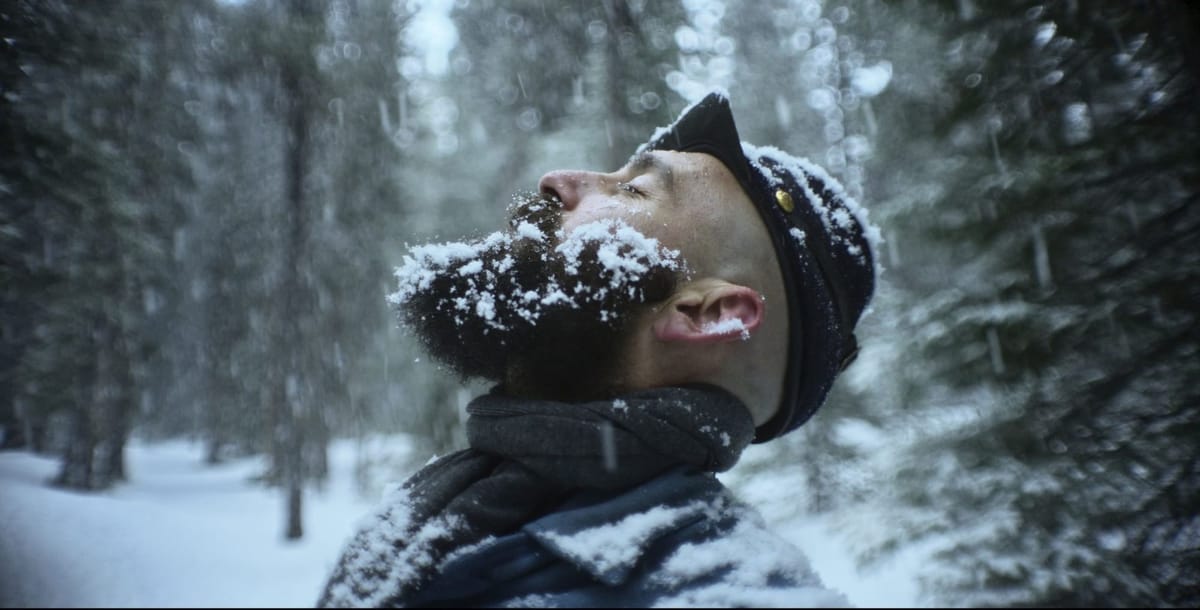"The Damned" is a very quiet war movie

Roberto Minervini knows it’s bad here, and how we got here, and he’s not even from here.
An Italian writer-director who’s lived in the United States for quite some time, much of it spent working in Texas, he makes films that defies easy categorization, including early features that intentionally blur the lines separating documentary and narrative fiction.
Those films were the subject of a recent retrospective in Los Angeles that laid out his ongoing subject: the lives of people locked out of privilege. There’s “The Passage” (2011), about a trio of near-strangers on a medically urgent road trip through Texas; “Low Tide” (2012), in which a 12-year-old boy survives amidst neglect and appears in the film alongside his real mother; and “Stop the Pounding Heart” (2013), about a fundamentalist family of homeschoolers on a Texas goat farm confronting the influence of the outside world. All of the films live in a desperately worrisome present, often starring people playing somewhat fictionalized versions of themselves. They share the screen with professional actors, involved in stories that seemingly mirror their own lives.
When Minervini can salvage a glimmer of hope from his generally downbeat scenarios, he doesn’t refuse to provide it. He does, however, refuse to intervene and provide empty promises. Similarly, he refuses to exploit his collaborators, even as the stories unfold in a mean, diminished country that allows the poor and otherwise marginalized to suffer needlessly.
“The Damned” is Minervini’s latest, currently playing in U.S. arthouses, and it’s his first period film, as well as his first that’s wholly fictional. The Civil War-set story of Union soldiers patrolling the Western territories, meeting violence from enemies and from the brutally frozen environment, is populated by a mixed cast of professional actors, people from the Montana region where production took place, and at least a few members of the same real-life, goat-raising Texas family who appeared briefly in “The Passage” and as the core cast of “Stop the Pounding Heart.”
The plot is minimal. The soldiers are meant to be scouting the land and keeping it secure. Otherwise, their collective task is unclear. In their copious downtime, they clean guns and teach each other how to use them. They compare notes on reasons they’re in the fight at all – escape, a job, proving something to themselves – and whether or not any of it is actually meaningful. Prayers are spoken, sometimes listened to and sometimes ignored.
There’s a short battle sequence with a far-off group of enemies, though who those people might be is never shown, and the chaos, though relatively short-lived, causes enough immediate death to make the remaining men unsure how to proceed. In spite of the uniforms and historical weight of the war, it’s less about fighting heroically than about the confusion of real people in frightening circumstances. Will they die because of a gun? From hunger? Frostbite?
The latter seems unnervingly close to a real possibility. Shot entirely outside – when it rains or snows, the cast is there catching it all – and using only natural light, cinematographer Carlos Alfonso Corral (who also provided the film’s score) and Minervini seem to be daring the men not to succumb to the elements. People, animals, trees, the vast landscape, and largely improvised dialogue build a quiet, intimate, observational opposite of an epic.
There are recurring scenes of self-protection as characters try to escape both the weather and gunfire, and gentle displays of familial bonding and friendship developing among soldiers listening to each other talk about their lives. This approach echoes Minervini’s other work: the three characters of “The Passage” who take care of each other to varying degrees in their collective time of need, the young boy of “Low Tide” keeping tightly to himself, and the strict over-protection on display in “Stop the Pounding Heart,” where religious life takes priority over any other human need, ironically leaving the kids on that goat farm vulnerable to shocks from the world outside.
In a way, “The Damned” is a prequel to those earlier films, a story of the moment in American history that left everything festering and unresolved. Without condescending to the past, lines are drawn from then to now. The mess of the 21st century – entire swaths of the nation mired in poverty, bigotry that remains embedded in law and culture, all for the benefit of a few – preserved by the fable of Reconstruction.
Not entirely without hope, Minervini’s output meets the challenge of frequently depressing subject matter with tenderness. It's an overtly humane body of work that holds on tightly to the people involved, delivering multiple finale shots where a sort of peace takes hold: sometimes quiet contemplation, sometimes metaphoric baptisms or reconciliations in lakes and oceans. In “The Damned,” as the snow falls, the title of the film meets a challenge to itself, turning war off for just moment. “It’s so quiet,” whispers one of the men, his beard covered, turning his face to a benediction from the sky.



